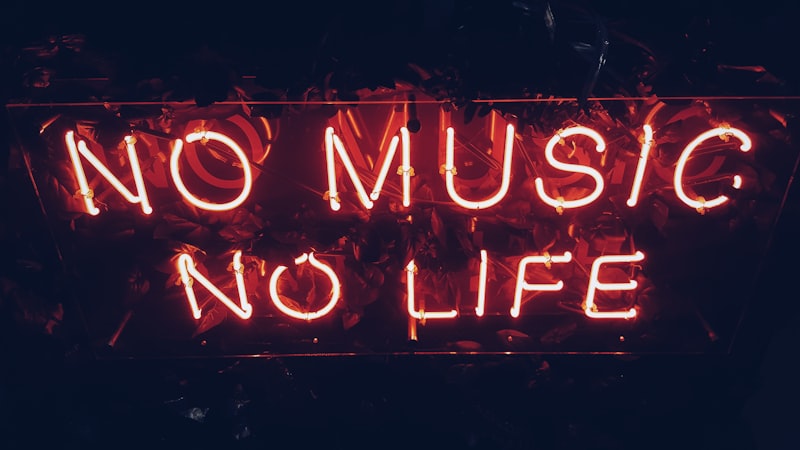Understanding the Impact of Music on Sleep Quality and Patterns

Introduction:
Have you ever wondered how music can influence your sleep quality and patterns? It’s astonishing how melodies and rhythms can create a serene soundscape that lulls us into a deep slumber. In this article, we will delve into the profound impact of music on our sleep and explore the science behind its soothing effects.
The Soothing Power of Melodies:
Music possesses a remarkable ability to calm our minds and relax our bodies. When we listen to slow-tempo tunes with gentle melodies, our heart rate gradually slows down, promoting a sense of tranquility. It’s as if the music is whispering to our subconscious, signaling it’s time to unwind and enter a state of restfulness.
Syncing with Brain Waves:
Did you know that music has the power to synchronize with our brain waves? Our brain produces different types of electrical patterns during various stages of sleep. By choosing the right genre and tempo, such as classical or ambient music, we can align the rhythm of the music with our brain activity, optimizing our sleep experience. This synchronization can enhance deep sleep and improve overall sleep quality.
Regulating Stress Hormones:
Stress and anxiety are common culprits that disrupt our sleep patterns. Fortunately, music can come to our rescue by reducing the production of stress hormones like cortisol. As we immerse ourselves in harmonious melodies, our bodies respond by releasing endorphins, which act as natural stress relievers. This process creates a tranquil environment conducive to falling asleep faster and staying asleep longer.

Blocking External Disturbances:
One of the greatest benefits of incorporating music into our sleep routine is its ability to mask external disturbances. Whether it’s noisy neighbors, traffic sounds, or even a snoring partner, music can provide a shield against these disruptions. By focusing our attention on the soothing sounds of music, we divert our mind from the outside world, allowing us to drift into a more peaceful slumber.
Creating a Sleep Ritual:
Establishing a bedtime ritual can signal our bodies that it’s time to unwind and prepare for sleep. Incorporating music as part of this ritual can be highly effective. By listening to the same calming songs or playlists every night, we create an association between the music and sleep. Over time, the mere act of playing these tunes will trigger a cascade of relaxation, preparing us for deep and restorative sleep.
Conclusion:
As you embark on your journey to improve your sleep quality and patterns, remember the transformative power of music. Through its soothing melodies, synchronization with brain waves, stress-reducing capabilities, ability to block external disturbances, and creation of a sleep ritual, music can truly revolutionize your sleep experience. So, put on your favorite tunes, let the melodies guide you, and embrace the incredible impact of music on your sleep.
Harmony for a Good Night’s Sleep: Exploring the Soothing Power of Music on Sleep Quality
Introduction:
Have you ever wondered how music can transform your sleep experience? From lullabies to symphonies, music has the incredible ability to soothe our minds and bodies, creating a harmonious environment for a restful night’s sleep. In this article, we will delve into the captivating realm of the soothing power of music on sleep quality, uncovering the secrets behind this age-old practice.
The Rhythmic Impact of Music:
When we listen to calming melodies or gentle tunes before bedtime, our brains respond by releasing serotonin and dopamine, commonly known as the “feel-good” hormones. These neurotransmitters help us relax, reduce anxiety, and ease the transition into a peaceful slumber. The rhythmic patterns and harmonious tones in music can synchronize with our natural sleep rhythms, promoting a sense of tranquility that prepares us for a deep and rejuvenating sleep.
Reducing Stress, Unleashing Serenity:
Modern lifestyles often subject us to high levels of stress, making it challenging to unwind and fall asleep effortlessly. However, studies have shown that listening to music before bed can significantly reduce stress levels. It acts as a powerful tool in unwinding the mind, helping us escape the day’s worries and allowing our bodies to embrace a state of calmness. By incorporating soothing melodies into your evening routine, you can bid farewell to restless nights and welcome a serene state of mind.


Creating an Atmosphere of Comfort:
Imagine entering a world where notes dance around you, creating an atmosphere of comfort and relaxation. The right music can transform your bedroom into a haven of tranquility. To enhance your sleeping environment, choose soft, instrumental music or ambient sounds that resonate with your personal preferences. Nature-inspired melodies like gentle raindrops or soft waves crashing against the shore can transport you to a place of serenity, making it easier to drift into dreamland.
The Power of Personalized Playlists:
Just as each person’s sleep preferences vary, so does their taste in music. Creating a personalized playlist tailored to your unique preferences can unlock the full potential of music’s soothing effects on sleep. Experiment with different genres, tempos, and artists until you find the combination that resonates with you. Whether it’s classical masterpieces, ambient sounds, or contemporary melodies, curating a playlist that speaks to your soul will amplify the therapeutic benefits of music for a good night’s sleep.
Conclusion:
As we conclude our exploration of the soothing power of music on sleep quality, it becomes evident that harmonizing the melodies with our sleep routines can be a game-changer. By embracing the rhythmic impact of music, reducing stress levels, creating a serene atmosphere, and crafting personalized playlists, we can unlock the gateway to a restful night’s sleep. So, next time you find yourself tossing and turning, let the symphony of soothing tunes guide you towards a blissful slumber.
Unlocking the Rhythms of Rest: How Music Influences Sleep Patterns and Deepens Slumber
Do you ever find yourself struggling to fall asleep at night? Or perhaps you wake up feeling groggy and unrested? Well, the solution to your sleep woes might just be a melody away. It turns out that music, with its enchanting rhythms and soothing melodies, has the power to influence our sleep patterns and deepen our slumber.
When we listen to music, our brains respond in remarkable ways. Research has shown that slow, gentle tunes have a calming effect on the nervous system, lowering heart rate and reducing stress levels. This relaxing response sets the stage for a peaceful transition into sleep. Just like a lullaby soothes a baby, music can help adults unwind and prepare their minds and bodies for rest.

Choosing the right kind of music is key to optimizing our sleep experience. Gentle classical compositions or soft instrumental tracks are often recommended for their tranquilizing qualities. These genres have a slower tempo and minimal fluctuations, creating a repetitive and predictable pattern that promotes relaxation. Such rhythmic consistency helps synchronize brainwaves, inducing a sense of deep tranquility and harmony conducive to sleep.
Moreover, music can serve as a powerful distraction from intrusive thoughts that might keep us tossing and turning. By capturing our attention and diverting it away from worries, music acts as a mental escape, allowing us to let go of stress and drift off to dreamland. It serves as a pleasant companion, guiding our thoughts away from the day’s challenges and inviting a state of serenity.
In addition to aiding falling asleep, music also plays a role in improving the quality and duration of our slumber. Studies have found that listening to music during different stages of sleep can enhance the various cycles, particularly deep sleep and rapid eye movement (REM) sleep. These are crucial phases for memory consolidation, emotional regulation, and overall cognitive function.
The power of music lies in its ability to tap into our emotions and create a profound impact on our well-being. By unlocking the rhythms of rest, music has the potential to revolutionize our sleep experiences. So, the next time you find yourself yearning for a good night’s sleep, why not dim the lights, put on some soothing tunes, and let the melodies guide you into a world of peaceful slumber?
Unlock the potential of music, embrace its influence, and experience the transformative power it holds over your sleep patterns. Let music be the magical key that unlocks the door to restful nights and rejuvenating mornings.
Soundscapes of Serenity: Researchers Uncover the Positive Effects of Music on Sleep
Introduction:
Have you ever wondered how music can affect your sleep? Recent research has shed light on the fascinating connection between music and a good night’s rest. In this article, we delve into the captivating world of soundscapes and uncover the positive effects of music on sleep. Prepare to be amazed as we explore the soothing power of melodies and rhythms that can transform your bedtime routine.
The Science Behind Music and Sleep:
Scientists have long been intrigued by the impact of music on our well-being, and sleep is no exception. Numerous studies have revealed that specific types of music can promote relaxation, reduce anxiety, and facilitate a deeper and more restful sleep. By engaging our auditory senses, music has the remarkable ability to influence brain activity, regulate heart rate, and even synchronize breathing patterns.
Creating a Tranquil Environment:
Imagine transforming your bedroom into a haven of tranquility through carefully curated melodies. Whether it’s classical tunes, ambient sounds, or gentle instrumental compositions, finding the right musical ambiance can make all the difference. Just like a lullaby gently lulls a baby to sleep, music can guide our minds into a state of serenity, helping us let go of daily stressors and promoting a peaceful slumber.

Rhythmic Entrancement:
One intriguing aspect of music’s effect on sleep lies in its rhythmic properties. Rhythms have an innate ability to captivate our attention and induce a state of entrainment, where our body’s biological rhythms align with the external beat. This synchronization can lead to slower and more controlled breathing, a decrease in heart rate, and an overall sense of relaxation. It’s as if the music guides our bodies into a harmonious dance with the melodies themselves.
Personalizing Your Soundscape:
Each individual has unique preferences when it comes to music. Some may find solace in melodic classical compositions, while others may prefer the gentle whispers of nature or ambient sounds. The key is to discover what resonates with you personally and create a tailored soundscape that suits your taste. Experiment with different genres, tempos, and instruments to find the perfect musical companions that will escort you into dreamland.
Conclusion:
From Lullabies to Beats: Investigating the Diverse Genres that Enhance Sleep Quality
Are you tired of counting sheep to fall asleep? Well, in this article, we will explore the fascinating world of music and its diverse genres that can enhance your sleep quality. From soothing lullabies to ambient beats, there’s a genre for everyone seeking a tranquil slumber.
When it comes to lullabies, they have been used for centuries to calm restless infants. The gentle melodies and rhythmic patterns create a comfortable environment that promotes relaxation. Even as adults, we can benefit from these timeless tunes. Lullabies not only help us unwind but also evoke nostalgic emotions that transport us back to simpler times.
Moving on to classical music, it has long been celebrated for its ability to soothe the mind and body. Composers like Mozart and Bach crafted masterpieces that provide a serene backdrop for sleep. The harmonious compositions and delicate orchestration induce a sense of tranquility, easing you into a peaceful slumber.
For those who prefer a more contemporary touch, ambient music offers a unique experience. This genre embraces atmospheric sounds, creating an immersive sonic landscape that promotes deep relaxation. Ambient beats, with their repetitive and hypnotic rhythms, can guide your mind into a meditative state, allowing you to drift off effortlessly.
Nature sounds are another popular choice for enhancing sleep quality. The gentle rustling of leaves, the rhythmic crashing of waves, or the soft patter of rain can create a soothing ambiance that mimics the great outdoors. These natural sounds have a calming effect and can help drown out disruptive noises, providing a cocoon of serenity for a restful night’s sleep.
Lastly, let’s not forget about instrumental music. Whether it’s instrumental versions of popular songs or original compositions, instrumental music offers a melodic journey without the distraction of lyrics. By removing the element of words, instrumental tracks allow your mind to focus solely on the music, aiding relaxation and promoting better sleep.




